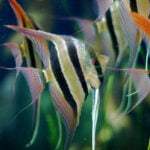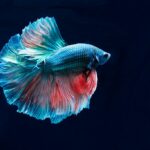Table of Contents
Goldfish are popular pets known for their vibrant colors and lively behavior. To keep them healthy and thriving, it’s crucial to provide a balanced diet. Understanding the diet and nutrition for Goldfish can help ensure they live long, healthy lives. This guide covers the essential aspects of Goldfish nutrition, types of food, feeding practices, and common dietary issues.

Understanding Goldfish Nutritional Needs
Goldfish have specific dietary requirements that must be met to support their growth, coloration, and overall health. A balanced diet and nutrition for Goldfish should include a variety of nutrients, including proteins, carbohydrates, fats, vitamins, and minerals. Providing a diverse diet ensures they receive all the necessary nutrients. For more detailed information on Goldfish nutrition, visit The Spruce Pets.
Types of Food for Goldfish
Goldfish can consume a range of foods, both commercial and natural. Here are some of the best types of food to include in their diet:
Commercial Fish Food
- Pellets: Pellets are a popular choice for Goldfish and come in various sizes and formulations. They sink slowly, allowing Goldfish to feed naturally.
- Flakes: Flakes are another common option. However, they can cause issues if not eaten quickly, as they may contaminate the water.
- Gel Food: Gel food is a nutritious option that mimics the Goldfish’s natural diet and reduces the risk of overfeeding.
Live and Frozen Foods
- Brine Shrimp: Brine shrimp are a high-protein food that Goldfish love. They can be fed live or frozen.
- Bloodworms: Bloodworms are another protein-rich food that can be given live or frozen, providing variety and excitement to their diet.
- Daphnia: Daphnia, also known as water fleas, are excellent for digestive health and can be fed live or frozen.
Vegetables
- Peas: Peas are great for preventing constipation. Remove the skin and chop them into small pieces before feeding.
- Spinach: Spinach is rich in vitamins and can be blanched and chopped for Goldfish.
- Zucchini: Zucchini is another healthy vegetable that can be blanched and fed in small pieces.
Feeding Practices for Goldfish
Proper feeding practices are essential for maintaining the health and well-being of your Goldfish. Here are some tips for effective feeding:
- Feed Small Amounts: Goldfish have small stomachs, so it’s best to feed them small amounts several times a day.
- Avoid Overfeeding: Overfeeding can lead to digestive issues and poor water quality. Only feed what your Goldfish can consume in a few minutes.
- Maintain Variety: Offer a mix of different foods to ensure a balanced diet and prevent nutritional deficiencies.
- Observe Feeding Behavior: Watch your Goldfish during feeding to ensure all are eating and adjust portions as needed.
Common Dietary Issues in Goldfish
Goldfish can suffer from various dietary issues if their nutritional needs are not met. Here are some common problems and how to address them:
Constipation
Constipation is a common issue in Goldfish, often caused by a lack of fiber or overfeeding. Symptoms include a lack of feces, bloating, and lethargy.
Solution: Feed high-fiber foods like peas and ensure a balanced diet with adequate vegetables. More information can be found on Fishkeeping World.
Swim Bladder Disorder
Swim bladder disorder affects a Goldfish’s ability to maintain buoyancy. It can be caused by overfeeding, constipation, or poor water quality.
Solution: Fast your Goldfish for 24-48 hours, then feed them peas to clear their digestive system. Improve water quality and feeding practices. For more details, visit Chewy Pet Central.
Malnutrition
Malnutrition occurs when Goldfish do not receive a balanced diet, leading to poor growth, faded colors, and weakened immunity.
Solution: Provide a varied diet with high-quality commercial food and fresh vegetables. Ensure all essential nutrients are included. More guidance can be found on The Spruce Pets.
Conclusion on Diet and Nutrition for Goldfish
Understanding the diet and nutrition for Goldfish is crucial for their health and longevity. By providing a balanced diet with a variety of foods, maintaining proper feeding practices, and addressing common dietary issues, you can ensure your Goldfish thrive. Remember to observe their behavior and adjust their diet as needed. For more pet care tips and advice, visit our Pet Care Guide.
FAQs on Diet and Nutrition for Goldfish
How often should I feed my Goldfish?
Goldfish should be fed small amounts 2-3 times a day. Ensure they can consume the food within a few minutes to avoid overfeeding.
Can Goldfish eat human food?
Yes, certain human foods like peas, spinach, and zucchini can be fed to Goldfish. Avoid processed foods and ensure vegetables are prepared properly.
What should I do if my Goldfish is not eating?
If your Goldfish is not eating, check the water quality, ensure the food is appropriate, and observe for signs of illness. Consult a vet if the issue persists. For more information, visit PetMD.
Is it necessary to feed live food to Goldfish?
While not necessary, live food like brine shrimp and bloodworms can provide variety and enrichment. Frozen or freeze-dried alternatives are also good options.
How can I prevent constipation in my Goldfish?
To prevent constipation, include high-fiber foods like peas in their diet and avoid overfeeding. Maintain a balanced diet with a mix of proteins, vegetables, and commercial foods.
Are there any foods Goldfish should avoid?
Goldfish should avoid foods high in fat, sugar, and artificial additives. Avoid feeding them bread, crackers, and other processed human foods.











